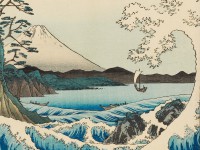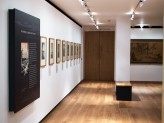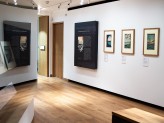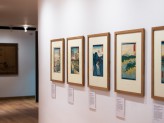Japanese Landscape Prints
(from 1st Nov 2009 until 25th Apr 2010)View the striking mountains, rivers, and cities of Japan in the woodblock prints of Hokusai and Hiroshige.

Introduction
Landscape painting has a long tradition in East Asian art. However, landscape did not become an important feature of Japanese woodblock prints until the early 1800s. By this time, Japanese citizens were taking part in more outdoor sightseeing activities, such as festivals, temple visits and boat trips, and there was a growing demand for souvenir images. In the competitive world of the publishing industry, publishers were constantly trying to develop new products, and landscape prints were a novelty.
Technical factors also played an important part in the emergence of the landscape print. Firstly, printers discovered how to apply pigment to give a gradation of colour on the paper. This technique made it possible to create subtle depictions of sea, sky and scenery. Also significant was the introduction of a new Western pigment known as Prussian Blue. Unlike earlier Japanese blues, which faded very quickly, this brilliant colour gave artists more freedom of expression, especially in the depiction of sky and water.
Was located in
Notice
Objects from past exhibitions may have now returned to our stores or a lender. Click into an individual object record to confirm whether or not an object is currently on display. Our object location data is usually updated on a monthly basis, so please contact the Jameel Study Centre if you are planning to visit the museum to see a particular Eastern Art object.
© 2013 University of Oxford - Ashmolean Museum







